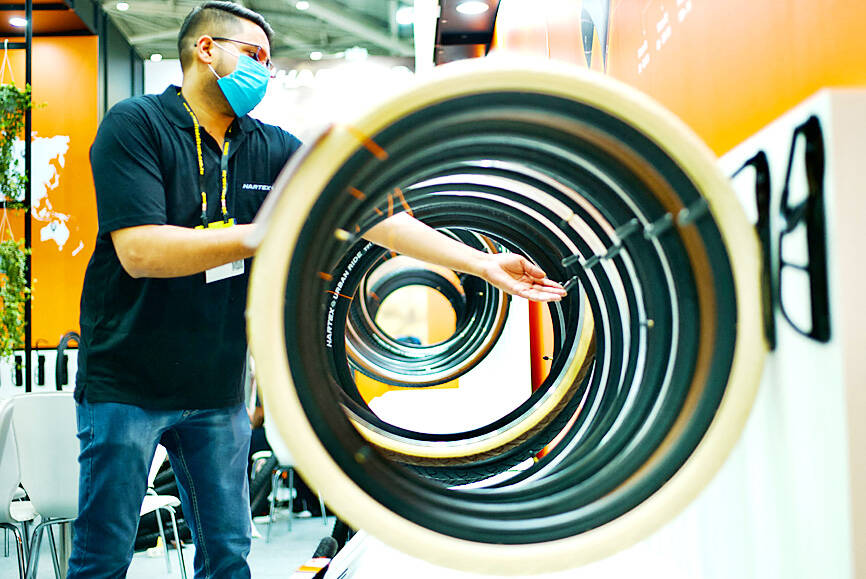The government’s business climate monitor last month signaled “blue” for the fourth consecutive month, indicating a recession, as global inflation and monetary tightening continued to constrain exports and other key economic barometers, the National Development Council said yesterday.
The total score for the nine monitoring indicators shed 1 point to 10, the lowest in 14 years, which indicates that the economy is unlikely to improve in the first half of the year amid an ongoing global economic slowdown, council research director Wu Ming-huei (吳明蕙) said.
“Poor exports are to blame,” Wu told a news conference in Taipei.

Photo: AFP
The outlook for exports, which accounts for 60 percent of GDP, appears dim due to weak end-market demand in the US and Europe, she said.
Taiwan is home to the world’s largest contract makers of electronics used in smartphones, notebook computers, TVs, wearable electronics, vehicles, servers, and Internet of Things and artificial intelligence applications.
Slack demand would not only limit exports, but also negatively affect sales prices and industrial output, Wu said.
The council uses a five-color system to portray the nation’s economic health, with “green” signifying steady growth, “red” suggesting a boom and “blue” reflecting a recession. Dual colors suggest a transition to a stronger or weaker state.
The monitor is likely to remain “blue” for a few more months, with a value of 10 expected for this month, Wu said.
The Directorate-General of Budget, Accounting and Statistics (DGBAS) forecasts export contraction through the third quarter, meaning that the chances of a quick recovery are small, she said.
The index of leading indicators, which seeks to project the economic situation in the coming six months, grew 1.17 percent to 100.95, rising for the fourth straight month on the back of better export orders, business confidence, construction floor areas, stock closing prices and labor accession rates, the council said.
However, the readings on money supply and imports of semiconductor equipment continued to display negative cyclical movements, it said.
The index of coincident indicators, which aims to measure the current economic situation, fell another 1.92 percent to 90.13, dragged by listless exports, industrial output, commercial sales and electricity usage, it said.
Improvement in the coincident index series is necessary for the council to judge whether the economy has bottomed out and is starting to recover, Wu said.
Leading indicators mainly reflect better business expectations on the part of corporations, while coincident data indicate solid economic upturns, she said.

The US dollar was trading at NT$29.7 at 10am today on the Taipei Foreign Exchange, as the New Taiwan dollar gained NT$1.364 from the previous close last week. The NT dollar continued to rise today, after surging 3.07 percent on Friday. After opening at NT$30.91, the NT dollar gained more than NT$1 in just 15 minutes, briefly passing the NT$30 mark. Before the US Department of the Treasury's semi-annual currency report came out, expectations that the NT dollar would keep rising were already building. The NT dollar on Friday closed at NT$31.064, up by NT$0.953 — a 3.07 percent single-day gain. Today,

‘SHORT TERM’: The local currency would likely remain strong in the near term, driven by anticipated US trade pressure, capital inflows and expectations of a US Fed rate cut The US dollar is expected to fall below NT$30 in the near term, as traders anticipate increased pressure from Washington for Taiwan to allow the New Taiwan dollar to appreciate, Cathay United Bank (國泰世華銀行) chief economist Lin Chi-chao (林啟超) said. Following a sharp drop in the greenback against the NT dollar on Friday, Lin told the Central News Agency that the local currency is likely to remain strong in the short term, driven in part by market psychology surrounding anticipated US policy pressure. On Friday, the US dollar fell NT$0.953, or 3.07 percent, closing at NT$31.064 — its lowest level since Jan.

The New Taiwan dollar and Taiwanese stocks surged on signs that trade tensions between the world’s top two economies might start easing and as US tech earnings boosted the outlook of the nation’s semiconductor exports. The NT dollar strengthened as much as 3.8 percent versus the US dollar to 30.815, the biggest intraday gain since January 2011, closing at NT$31.064. The benchmark TAIEX jumped 2.73 percent to outperform the region’s equity gauges. Outlook for global trade improved after China said it is assessing possible trade talks with the US, providing a boost for the nation’s currency and shares. As the NT dollar

The Financial Supervisory Commission (FSC) yesterday met with some of the nation’s largest insurance companies as a skyrocketing New Taiwan dollar piles pressure on their hundreds of billions of dollars in US bond investments. The commission has asked some life insurance firms, among the biggest Asian holders of US debt, to discuss how the rapidly strengthening NT dollar has impacted their operations, people familiar with the matter said. The meeting took place as the NT dollar jumped as much as 5 percent yesterday, its biggest intraday gain in more than three decades. The local currency surged as exporters rushed to